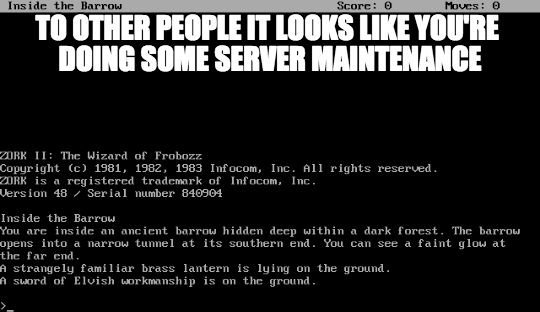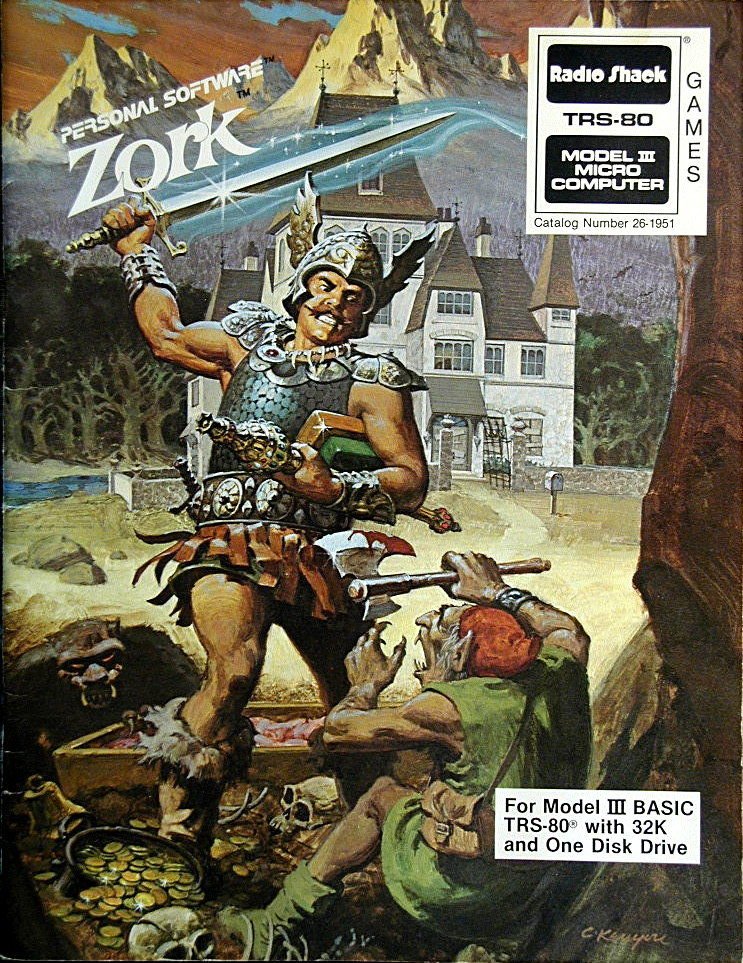"West of house. You are standing in an open field west of a white house with a boarded front door. There is a small mailbox here."
These are the first words a player sees when they open a new instance of the game "Zork", a text adventure game originally made in the late 1970's. Every time i read these words i get a tingle of nostalgia and a ripple of excitement runs through me. As I begin typing in directions and commands the text interface drops away and I enter the world of the vast underground empire which is built in part by the games descriptions and in part by my imagination. The descriptions in the game are detailed enough to transport you into the scene, but not so descriptive you lose interest in reading them.
The Word parsing engine built by the games developers was unique at the time making it so the game could understand more complex verbs and actions, which made it stand out among its peers. At the time of its creation, Zork was only available on the PDP-10 mainframe and was written in M.D.L as opposed to the more popular FORTRAN so the only way to play was to log into the MIT mainframe through ARPA-NET. Zork was never advertised in the beginning as it was a hobby project by gamers seeking to improve on the play style of Colossal Cave Adventure, and was only known by word of mouth. (I personally find this fascinating because this means the game was a Pre-internet viral sensation!)
Zork was created starting in 1977 by Tim Anderson, Marc Blank, Bruce Daniels, and Dave Lebling as a hobby project. They never intended to sell Zork but instead set out on a series of endeavors to create serious productivity software for the home and business market. As they realized they were lacking in capital to fund these projects, they decided to re-package Zork for sale to fund these other projects. The original game was too big to run on early home computers so some re-working was in order. The Game as broken into Three parts to be released over Three years:
Zork I: The Great underground Empire (1980)
Zork II: The Wizard of Frobozz (1981)
Zork III: The Dungeon Master (1982)
http://www.infocom-if.org/downloads/downloads.html
Link to free Downloads of the first 3 Zork Games
First released on the TRS-80 computer, Zork was eventually ported to just about every other home computer of its time. The Apple II, Atari Computers, and the IBM PC were some of the first ports available to the general public and sold over a million copies. The Success of the game fueled the the focus of the creators who abandoned their original plans of business software and instead focused on creating more games across a variety of genres. Some of these games included a Zork sequel, Beyond Zork: The Coconut of Quendor (1987) and the prequel, Zork Zero: The Revenge of Megaboz (1988).
As a gamer of many generations, I love the experience of finding something "new"(new to me I mean) that escaped my notice or came before me. Zork came to my attention through the Ernest Cline novel "Ready Player One" but is reminiscent of many games I played as a child like "The Oregon Trail" (1971) and "Dungeons and Dragons" (1974). The Nostalgia I now get from Zork is a callback to those times when your imagination was your best bet for having a great afternoon/party with friends/weekend sleepover.
Intrigued by the descriptions in the novel, I had to look it up to see what it was all about and soon fell into a rabbit hole of information. I HAD to play this game that seemed like the predecessor of so many adventure RPG's that i loved playing as a child, so i began searching and voila: I found the link above and began my adventure. (There is also an app version for Mobile called Frotz which also has a bunch of other text adventures including "Curses.") Hours later I was amazed at the world In which I had become immersed: I had wandered around for Hours and discovered very little about the game itself. Now in that time I accidentally did a lot of circles and learning, but this was a game that refused to help you! There is no tutorial, no impatient hinting system that spoon-feeds you information, there is only a score system that increases when you go the "right" way or find an important object. The puzzled presented in the game are intricate and at times vague, leaving you to guess your way through a lot. ( There are maps and guides available of course, but i wanted the original feel of having discovered the game on the MIT mainframe)
The takeaway for me: This game is amazing if your one of those people (like me) that love exploring the roots of video gaming. Among its twisting mazes and passages you can see the structure of future games and take note of things that changed the course of games to come forever. If you have some time to kill (long bus/plane/train ride) then give it a try and see if you get hooked on the mystery as quickly as I did.
Also worth noting is the Zork easter egg in Call of Duty: Black Ops at the computer terminal which you can access by typing "Zork" without quotes.
Also:
Happy Gaming Friends!

Congratulations @coldlogic! You received a personal award!
You can view your badges on your Steem Board and compare to others on the Steem Ranking
Vote for @Steemitboard as a witness to get one more award and increased upvotes!